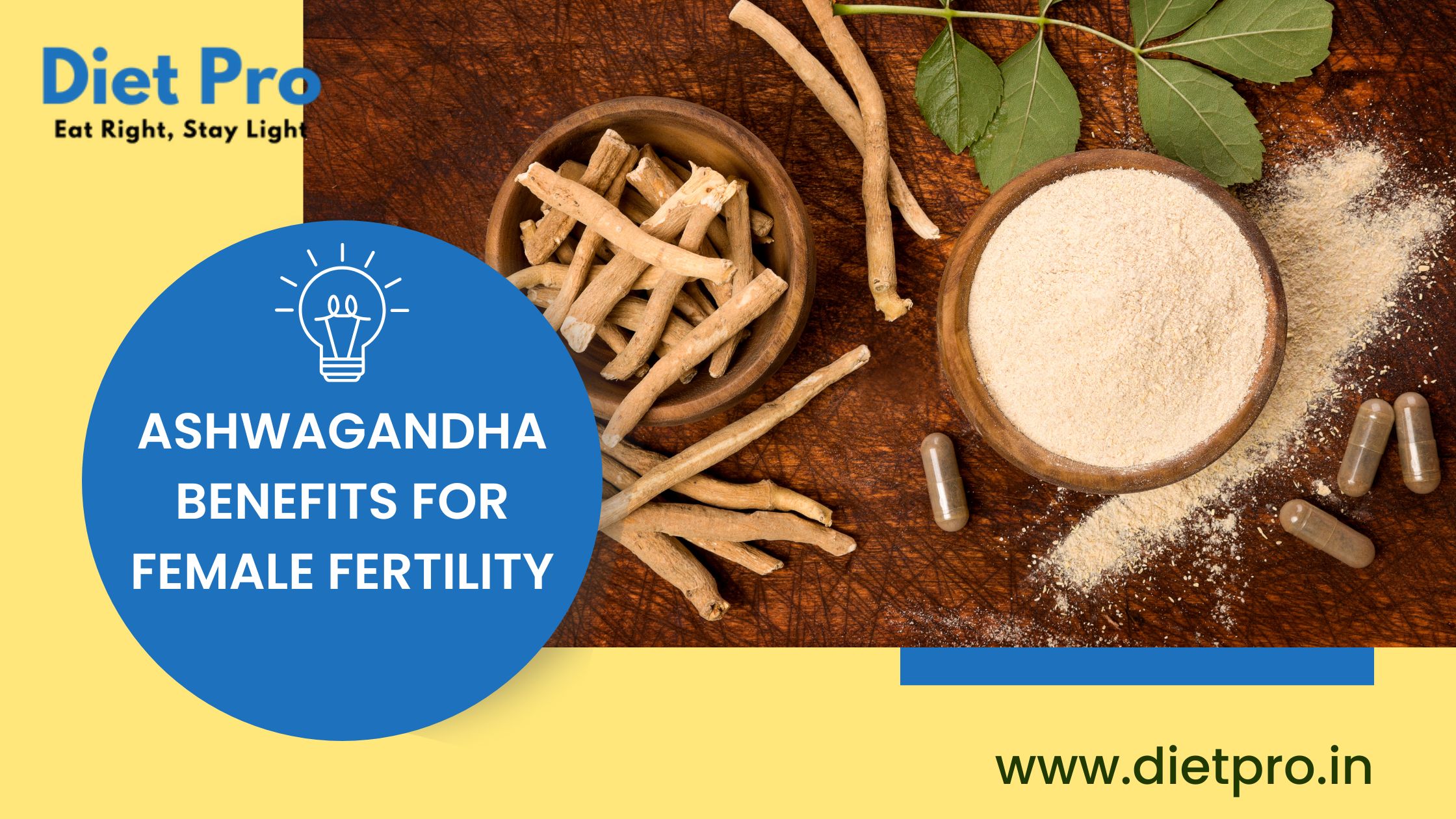Infertility is a challenging issue that affects numerous couples worldwide, and women, in particular, bear the burden of fertility struggles. However, nature often provides us with remedies, and one such powerful solution is Ashwagandha. Derived from Ayurvedic medicine, this ancient herb has gained attention for its potential in boosting female fertility. In this blog, we will delve into the wonders of Ashwagandha and explore how ashwagandha benefits for female fertility. So let’s start….
Ashwagandha Benefits for Female Fertility

Understanding Ashwagandha
Origins and Traditional Use
Ashwagandha, scientifically known as Withania somnifera, is a herb native to the dry regions of India, North Africa, and the Middle East. It has a rich history in Ayurvedic medicine, where it has been used for thousands of years to promote overall health and well-being. Ashwagandha’s name is derived from the Sanskrit words “Ashva” (meaning horse) and “Gandha” (meaning smell), referring to its distinct aroma and the belief that consuming it imparts the strength and vitality of a horse.
Ashwagandha’s Powerful Adaptogenic Properties
One of the key attributes of Ashwagandha is its adaptogenic nature. Adaptogens are substances that help the body adapt and respond better to stressors, whether physical, emotional, or environmental. Ashwagandha acts as a natural stress reliever, supporting the body’s ability to cope with stress and promoting a sense of calmness and relaxation.
Nutritional Composition and Active Components
Ashwagandha contains a range of beneficial compounds that contribute to its medicinal properties. These include:
- Withanolides: These bioactive compounds are primarily responsible for Ashwagandha’s adaptogenic effects. They have been found to modulate the body’s stress response, reduce inflammation, and support immune function.
- Alkaloids: Ashwagandha contains alkaloids like somniferine, sominine, and anferine, which have sedative properties and contribute to its calming effects.
- Steroidal Lactones: Known as withanolides, these steroidal compounds have antioxidant properties and are believed to promote overall health and vitality.
- Saponins: Ashwagandha contains saponins that have anti-inflammatory and immune-modulating effects, helping to protect against various diseases and support overall well-being.
The Link Between Ashwagandha and Female Fertility
A. Balancing Hormones: Regulation of the Endocrine System
Ashwagandha has been found to have a positive impact on hormonal balance, which is essential for optimal female fertility. It acts on the endocrine system, helping to regulate the production and functioning of hormones such as estrogen, progesterone, follicle-stimulating hormone (FSH), and luteinizing hormone (LH). By promoting hormonal balance, Ashwagandha may help regulate menstrual cycles and improve overall reproductive health. so these are some ashwagandha benefits for female fertility.
B. Stress Reduction: The Impact of Cortisol on Fertility
Stress can significantly affect female fertility by disrupting hormone levels and menstrual cycles. Ashwagandha is known for its stress-reducing properties and its ability to modulate the body’s stress response. It helps regulate cortisol, the primary stress hormone, by reducing its levels. By managing stress and cortisol levels, Ashwagandha may help restore hormonal balance and improve fertility.
C. Enhancing Ovulation: Promoting Regular Menstrual Cycles
Regular ovulation is crucial for successful conception. Ashwagandha has been observed to support regular menstrual cycles and promote ovulation. It aids in maintaining the delicate balance of hormones required for follicular development and the release of mature eggs. By promoting healthy ovulation, Ashwagandha increases the chances of successful fertilization.
D. Improving Egg Quality: Combatting Oxidative Stress and Aging
As women age, the quality of their eggs can decline due to increased oxidative stress and cellular damage. Ashwagandha is rich in antioxidants, which help combat oxidative stress and protect cells from damage. By reducing oxidative stress, Ashwagandha may contribute to improving egg quality and preserving ovarian function, particularly in women facing age-related fertility challenges.
Scientific Evidence and Research Studies
A. Clinical Studies on Ashwagandha and Female Fertility
- Study 1: Ashwagandha Extracts and Hormone Levels
- Study 2: Improved Ovarian Function and Follicular Development
- Study 3: Reduction in Stress and Increased Pregnancy Rates
B. Ashwagandha’s Impact on Reproductive Health
- Balancing Polycystic Ovary Syndrome (PCOS)
- Enhancing Assisted Reproductive Technologies (ART)
- Addressing Age-Related Fertility Decline
Recommended Dosage and Usage
When it comes to the dosage of Ashwagandha, it is important to note that individual needs may vary. It is always recommended to consult with a qualified healthcare professional, such as a naturopathic doctor or an Ayurvedic practitioner, to determine the appropriate dosage based on your specific health condition and goals. That being said, here are some general guidelines:
Consulting a Healthcare Professional:
Before starting any new supplement, including Ashwagandha, it is advisable to consult with a healthcare professional. They can assess your health status, review any potential interactions with medications or existing conditions, and provide personalized recommendations tailored to your needs.
Safe Consumption Guidelines:
Follow these guidelines to ensure safe consumption of Ashwagandha:
a. Start with a low dosage: Begin with a low dose, typically around 300-500 mg per day, and gradually increase it over time as your body adjusts.
b. Choose high-quality products: Purchase Ashwagandha supplements or powders from reputable brands that undergo rigorous testing for quality, purity, and potency.
c. Follow recommended cycle periods: Some experts recommend cycling Ashwagandha, taking it for a few weeks or months, followed by a break to avoid potential tolerance or dependency.
d. Consider timing: Take Ashwagandha with meals to enhance absorption and minimize the chances of gastrointestinal discomfort.
Forms of Ashwagandha: Supplements, Powders, or Tea:
Ashwagandha is available in different forms, including:
a. Supplements: Ashwagandha is commonly available in capsule or tablet form. Follow the recommended dosage provided by the manufacturer or as advised by your healthcare professional.
b. Powders: Ashwagandha powder can be added to smoothies, beverages, or foods. Start with a small dose, such as 1-2 teaspoons, and gradually increase if needed.
c. Tea: Ashwagandha tea can be made by steeping the dried root or powder in hot water. However, the active compounds may not be as concentrated as in supplements or powders, so higher amounts may be needed.
Precautions and Possible Side Effects
While Ashwagandha is generally considered safe for most people, it is important to be aware of potential precautions and side effects associated with its use. Here are some important considerations:
- Potential Interactions with Medications: Ashwagandha may interact with certain medications, including immunosuppressants, sedatives, thyroid medications, and medications for diabetes or blood pressure. It is crucial to consult with a healthcare professional before taking Ashwagandha if you are currently on any medications to avoid any potential interactions or adverse effects.
- Allergic Reactions and Adverse Effects: Some individuals may experience allergic reactions to Ashwagandha. If you develop symptoms such as itching, rash, swelling, or difficulty breathing after consuming Ashwagandha, discontinue use and seek medical attention immediately. Additionally, some people may experience digestive issues such as upset stomach, diarrhea, or nausea. Starting with a low dose and gradually increasing it may help minimize these side effects.
- Not Suitable for Pregnant Women or Breastfeeding Mothers: Ashwagandha is not recommended for use during pregnancy or while breastfeeding due to limited research on its safety in these situations. It is important to prioritize the health and safety of both the mother and the baby. If you are pregnant, breastfeeding, or planning to become pregnant, it is advisable to avoid Ashwagandha supplementation unless specifically recommended by a qualified healthcare professional.
Other Benefits of Ashwagandha
Ashwagandha offers a range of other advantages for overall health and well-being. Let’s explore some of these ashwagandha benefits for female fertility:
- Stress Reduction and Improved Mental Well-being: Ashwagandha is renowned for its adaptogenic properties, which help the body manage and adapt to stress. It can support the reduction of cortisol, the primary stress hormone, and promote a sense of calmness and relaxation. Regular consumption of Ashwagandha may help alleviate symptoms of anxiety, improve mood, and enhance overall mental well-being.


3. Anti-inflammatory and Antioxidant Properties: Ashwagandha is rich in antioxidants, which help protect the body against free radicals and oxidative stress. Its anti-inflammatory properties may help reduce inflammation and support the management of chronic inflammatory conditions, such as arthritis. By reducing inflammation and oxidative stress, Ashwagandha contributes to overall health and may have a positive impact on various organ systems.
4. Cognitive Function and Memory Enhancement: Studies suggest that Ashwagandha may have neuroprotective properties and support cognitive function. It has been found to enhance memory, improve attention and focus, and promote overall brain health. Ashwagandha’s ability to reduce oxidative stress and inflammation in the brain may contribute to these cognitive benefits. This is also one of Ashwagandha benefits for Female Fertility
5. Hormonal Balance and Sexual Health: Ashwagandha has been traditionally used to support male reproductive health and hormone balance. It may help enhance testosterone levels, improve sperm quality, and promote male fertility. Additionally, Ashwagandha may have positive effects on sexual health and libido in both men and women. Offcousre this one is the Ashwagandha benefits for Female Fertility.
6. Anti-aging Effects: Ashwagandha’s antioxidant properties help combat cellular damage and oxidative stress, which are associated with aging. By reducing oxidative stress, Ashwagandha may help slow down the aging process, promote healthy aging, and support longevity. This is also a major Ashwagandha benefits for Female Fertility.
Conclusion
Ashwagandha is a powerful herb with immense potential to improve female fertility and reproductive health. Its adaptogenic properties, hormonal balancing effects, and stress-reducing capabilities make it a valuable natural solution for couples facing fertility challenges. While scientific research on Ashwagandha’s fertility benefits is still ongoing, the existing evidence is promising. However, it is crucial to consult with a healthcare professional before incorporating Ashwagandha into your fertility journey. By leveraging the ancient wisdom of Ayurveda, Ashwagandha offers hope and support for women seeking to enhance their fertility and realize their dreams of starting or expanding their family. So these are some ashwagandha benefits for female fertility.
Read More :- Benefits of Kulekhara Leaves
